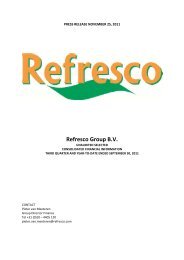Create successful ePaper yourself
Turn your PDF publications into a flip-book with our unique Google optimized e-Paper software.
Market review 2009<br />
“I feel that indirectly private labels<br />
are the spur of growth in A-brands”<br />
We also talked with Charles Bouaziz, Presi<strong>de</strong>nt of PepsiCo<br />
Western Europe. He gives his view on <strong>de</strong>velopments in private<br />
label from the perspective of a major A-brand soft drink and<br />
juice manufacturer.<br />
What is your strategy for maintaining market share in<br />
competition with private label?<br />
“Our competition with private label highly <strong>de</strong>pends on the<br />
brands and market segments involved. Taking the case of<br />
juice in the French market, there is frankly little movement<br />
between our brand Tropicana and private label, since there is<br />
not sufficient immediate price difference for people to switch<br />
from the brand to a private label. A look at the juice market in<br />
Germany reveals the same consumer behavior: Punica seems to<br />
be market lea<strong>de</strong>r in fruit-juice based beverages. Then we play<br />
on innovation and differentiation to stay ahead of the curve. In<br />
the carbonated soft drinks segment you see more competition,<br />
especially for brands such as Pepsi.<br />
The fundamental difference with juices is that in CSDs – and<br />
especially in colas - both private label and we have a price<br />
position enabling us to attempt to challenge the lea<strong>de</strong>r<br />
Coca-Cola. It is more appropriate to consi<strong>de</strong>r Pepsi as more of<br />
an ally of private label in the assault on the large segment-dominant<br />
brand than to view the market as one where competition<br />
exists between private label and us. We recognize that some<br />
transfer occurs between the two, especially regarding people<br />
who are heavily price conscious and who switch from Coca-Cola<br />
to Pepsi or private label. This is less the case in other categories<br />
than cola. In the RTD tea segment, for example, there is no<br />
other A-brand than Lipton. The alternatives to Lipton can only<br />
be found in private label, but this will change next year as we<br />
expect Oasis Tea to be introduced in the market. This should<br />
<strong>de</strong>finitely help to bring more dynamism in this segment.”<br />
Are price and promotion the current critical success factors?<br />
“It is difficult to isolate a single parameter. When you have the<br />
ambition to <strong>de</strong>velop a brand you cannot just rely on the factors<br />
of price and promotion. We invested more in brand i<strong>de</strong>ntity<br />
during the period of crisis. This gave us a competitive advan-<br />
Charles Bouaziz, Pepsico West Europe<br />
tage because it helped to distinguish us from other brands that<br />
invested less during the crisis. Because of investment in the<br />
brand, we had been investing less in promotions in response to<br />
distributor <strong>de</strong>mand. Afterwards, we lost some sales opportunities<br />
because of this strategy. The lack of aggressive promotion<br />
meant that our brands could not be retained. We are therefore<br />
required to combine the two. If investments in the brand are replaced<br />
by promotions, the industrial role of an A-brand is abandoned<br />
and we compete on the same grounds as private label.<br />
It would be surprising for Pepsi to cut out brand investments.”<br />
Where will innovation in non-alcoholic beverages and juices<br />
come from? Private label or A-brands?<br />
“The truth is, there is frequently no breakthrough innovation,<br />
only improvements of the product, which can occur on different<br />
levels: manufacturing, packaging or on product level. Innovations<br />
in manufacturing are often not perceived by consumers,<br />
and need to be communicated extensively. Consumers do tend<br />
to benefit, but more at an ethical level (like for example a better<br />
carbon footprint), which is highly <strong>de</strong>termined by subjectivity.<br />
The packaging market has been very static for years, so limited<br />
innovations there. Innovations are more sophisticated at product<br />
level, specifically with regard to raw material sourcing, which<br />
can create different product qualities. Take sanguine orange, for<br />
example – our competitive edge comes from our exclusive sourcing<br />
from Sicily. It remains unique on the market because no one<br />
has ever succee<strong>de</strong>d in finding an equivalent, but that has led to<br />
limited innovation.”<br />
Can private label products enable growth<br />
in product categories?<br />
“I feel that indirectly private labels are the spur of growth in<br />
A-brands. In a market where there is no competition on brand<br />
level, such as in tea beverages, private labels are replacing the<br />
alternative A-brand and force us to be more efficient (quality,<br />
price, etc.). In a competitive market, they are the custodians of<br />
the relation with the consumers. By this, I mean that a lower<br />
price private label prevents A-brands from losing contact with<br />
reality. In general, private label have an important social role in







